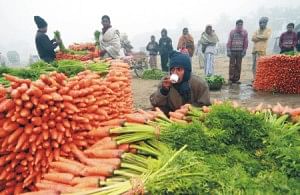Getting less for money

Shafiq Islam/ Drik News
We have been hearing for quite a few months now that oil prices are fuelling up in the international market, and so are the prices of various other tradable commodities. There may be many geo-political reasons behind this. Traditional energy resources are also getting scarce worldwide.
The idea of releasing croplands for producing bio-fuel has also sparked a global debate. We hear people often blaming greed-driven middlemen and hoarders for the unabated hike in the prices of essentials in our local markets. And now, in recent weeks, newspapers write in block letters that government advisors are also concerned about the skyrocketing of commodity prices. They acknowledge the fact that people are struggling because of the growing prices of daily essentials.
Post 1/11 days saw the government entrusting the BDR with the task of offsetting high market prices of essentials. Initially, they erected many makeshift just-price bazaars and, lately, some permanent ones also at very prominent places like the BDR shop near the NAM flats compound.
But, there were big headlines in newspapers when the BDR chief proclaimed the other day that he did not see any possibility of any downslide in commodity prices in the next six months.
All said and done, there appears to be no good mornings waiting for the economically hard-pressed burgeoning lower-middle class people in days to come as far as purchasing their daily necessities is concerned. Not to speak of the poor and the ultra-poor who are finding it increasingly difficult to survive. There is no immediate relief, no escape.
As people's purchasing capacities are eroding fast many are struggling hard to cope with the situation. It had never been anticipated before that in spite of several market-intervention efforts undertaken by the government things would not go, no way, in favour of the consumers.
With the government now mostly leaving the market forces to determine the prices, the consumers are left with few options to cope with the situation.
Consumers -- especially the service-holders and the fixed-income group -- have been pushed up against the wall. They are getting much less for their money. On the other hand, in these days of nationwide anti-graft drive and in the midst of an unusually long lead-time before the probable next democratic elections, there are hardly any benevolent employers in the private sector to hike employees' pay-package to make life a bit easier.
It's a trying time for the urban consumers, and people are negotiating with the up-trend in an unusual way. Families are learning to consume less, changing their dietary habits for the sake of getting the same value for their money. Families that would normally consume five litres of edible oil a month are now starting to make it with three litres a month.
But again, as one Dhaka consumer was complaining, even leafy vegetables are getting more costly these days -- people are in a real fix now!
It is not only the prices (of rice, potato, onion, meat, fish and vegetables) that are on the rise, consumers have to more for their conveyance, house-rent and medication. With the year coming to an end landlords will ask for enhanced house-rent, and city cabbies and the drivers of CNG-run three-wheelers will ask for more fare than their meters read on the excuse that they have to survive in a hot market too.
Now, where does an average consumer go for refuge? Everyone out there providing him or her any service is asking for extra money on the pretext of increased living costs, but who'll pay the consumer an extra income?
Inflation rate has hit double digit and food price inflation is even higher. If the people who are paying through their noses seek redress in consuming less to tackle the situation, we can't expect anything but a malnourished future generation. A government can't simply leave the market forces to determine the prices, especially when we know that the market is prone to price manipulation.
Its high time that the government ensured stringent market monitoring; evolved innovative market interventions and worked out some sort of relief package for the hard-pressed consumers -- pay hike, rationing, subsidies, whatever. They should be given back the worth of their hard-earned money.
Reaz Ahmad is Chief Operating Officer of a communication consultancy firm and a freelance contributor to The Daily Star.

 For all latest news, follow The Daily Star's Google News channel.
For all latest news, follow The Daily Star's Google News channel. 



Comments